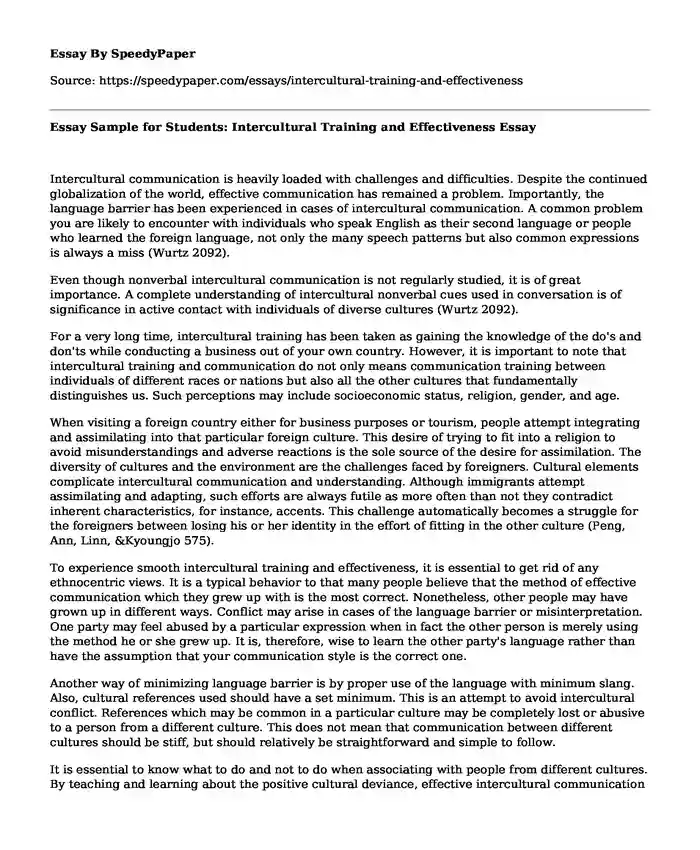
| Type of paper: | Essay |
| Categories: | Intercultural communication |
| Pages: | 3 |
| Wordcount: | 633 words |
Intercultural communication is heavily loaded with challenges and difficulties. Despite the continued globalization of the world, effective communication has remained a problem. Importantly, the language barrier has been experienced in cases of intercultural communication. A common problem you are likely to encounter with individuals who speak English as their second language or people who learned the foreign language, not only the many speech patterns but also common expressions is always a miss (Wurtz 2092).
Even though nonverbal intercultural communication is not regularly studied, it is of great importance. A complete understanding of intercultural nonverbal cues used in conversation is of significance in active contact with individuals of diverse cultures (Wurtz 2092).
For a very long time, intercultural training has been taken as gaining the knowledge of the do's and don'ts while conducting a business out of your own country. However, it is important to note that intercultural training and communication do not only means communication training between individuals of different races or nations but also all the other cultures that fundamentally distinguishes us. Such perceptions may include socioeconomic status, religion, gender, and age.
When visiting a foreign country either for business purposes or tourism, people attempt integrating and assimilating into that particular foreign culture. This desire of trying to fit into a religion to avoid misunderstandings and adverse reactions is the sole source of the desire for assimilation. The diversity of cultures and the environment are the challenges faced by foreigners. Cultural elements complicate intercultural communication and understanding. Although immigrants attempt assimilating and adapting, such efforts are always futile as more often than not they contradict inherent characteristics, for instance, accents. This challenge automatically becomes a struggle for the foreigners between losing his or her identity in the effort of fitting in the other culture (Peng, Ann, Linn, &Kyoungjo 575).
To experience smooth intercultural training and effectiveness, it is essential to get rid of any ethnocentric views. It is a typical behavior to that many people believe that the method of effective communication which they grew up with is the most correct. Nonetheless, other people may have grown up in different ways. Conflict may arise in cases of the language barrier or misinterpretation. One party may feel abused by a particular expression when in fact the other person is merely using the method he or she grew up. It is, therefore, wise to learn the other party's language rather than have the assumption that your communication style is the correct one.
Another way of minimizing language barrier is by proper use of the language with minimum slang. Also, cultural references used should have a set minimum. This is an attempt to avoid intercultural conflict. References which may be common in a particular culture may be completely lost or abusive to a person from a different culture. This does not mean that communication between different cultures should be stiff, but should relatively be straightforward and simple to follow.
It is essential to know what to do and not to do when associating with people from different cultures. By teaching and learning about the positive cultural deviance, effective intercultural communication can be successfully promoted. Pedagogy around the positive cultural deviance can give the learners conditions of becoming deeply knowledgeable in how cognition works, and deliver such worldwide learning outcomes in the application of what has been learned, appreciating diversity of culture, the benefit of taking a perspective, and self-efficacy in starting change in intercultural behavior (Wurtz 2098-2100)..
Works Cited
Peng, Ann C., Linn Van Dyne, and Kyoungjo Oh. "The influence of motivational cultural intelligence on cultural effectiveness based on study abroad: The moderating role of participant's cultural identity." Journal of Management Education 39.5 (2015): 572-596.
Wurtz, Olivier. "An empirical investigation of the effectiveness of pre-departure and in-country cross-cultural training." The International Journal of Human Resource Management 25.14 (2014): 2088-2101.
Cite this page
Essay Sample for Students: Intercultural Training and Effectiveness. (2022, Aug 23). Retrieved from https://speedypaper.com/essays/intercultural-training-and-effectiveness
Request Removal
If you are the original author of this essay and no longer wish to have it published on the SpeedyPaper website, please click below to request its removal:
- Essay Example Describing Pros and Cons of Processed Foods
- Moving Companies Essay Samples
- Personal Journal Entry: Essay Example
- Essay Sample: UKs GNI and Its Level of Participation in Globalization
- Free Essay Sample on the Kennewick Man
- Paper Example. G.I. Jane (1997)
- Free Essay Example on Slowly Towards the North
Popular categories




